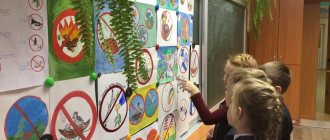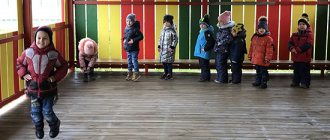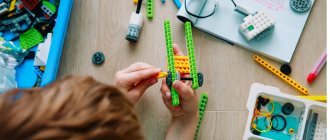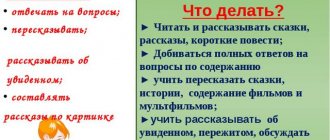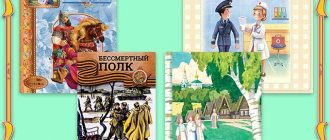The role of children's fiction in the formation of a child's personality and speech development
O. I. Nikiforova distinguishes three stages in the development of perception of a work of art: direct perception, reconstruction and experience of images (based on the work of imagination); understanding the ideological content of the work (it is based on thinking); the influence of fiction on the reader’s personality (through feelings and consciousness).
A child's interest in books appears early. At first, he is interested in turning the pages, listening to an adult read, and looking at the illustrations. With the advent of interest in the picture, interest in the text begins to arise. As research shows, with appropriate work, already in the third year of a child’s life, it is possible to arouse his interest in the fate of the hero of the story, force the baby to follow the course of the event and experience feelings that are new to him.
As mentioned above, one of the features of children’s perception of a literary work is empathy for the characters. Perception is extremely active. The child puts himself in the place of the hero, mentally acts, fights his enemies. At puppet theater performances, children sometimes interfere in events, try to help the hero, and in unison tell the characters what not to do.
Based on the characteristics of perception, the leading tasks of familiarizing with the book at each age stage are put forward.
Let us briefly dwell on the age-related characteristics of perception. For children of primary preschool age
characteristic: dependence of text understanding on the child’s personal experience; establishing easily recognizable connections when events follow each other; the main character is in the spotlight, children most often do not understand his experiences and motives for his actions; the emotional attitude towards the characters is brightly colored; there is a craving for a rhythmically organized style of speech.
In middle preschool age
Some changes occur in the understanding and comprehension of the text, which is associated with the expansion of the child’s life and literary experience. Children establish simple causal connections in the plot and, in general, correctly evaluate the actions of the characters. In the fifth year, a reaction to the word appears, interest in it, the desire to repeatedly reproduce it, play with it, and comprehend it.
According to K.I. Chukovsky, a new stage of the child’s literary development begins, a keen interest arises in the content of the work, in comprehending its inner meaning.
In older preschool age
children begin to become aware of events that did not occur in their personal experience; they are interested not only in the actions of the hero, but also in the motives of actions, experiences, and feelings. They are able to sometimes pick up on subtext. An emotional attitude towards the characters arises on the basis of the child’s comprehension of the entire conflict of the work and taking into account all the characteristics of the hero. Children develop the ability to perceive text in the unity of content and form. The understanding of the literary hero becomes more complex, and some features of the form of the work are realized (stable turns of phrase in a fairy tale, rhythm, rhyme).
The role of fiction in children's development
Natalya Gukaichenko
The role of fiction in children's development
Fiction serves as a powerful , effective means of mental, moral and aesthetic education of children ; it has a huge impact on the development and enrichment of children's speech.
In poetic images, fiction reveals and explains to the child the life of society and nature, the world of human feelings and relationships. It makes emotions more intense, cultivates imagination and gives the preschooler excellent examples of the Russian literary language . These examples vary in their impact: in stories, children learn the conciseness and precision of words, in poetry they capture the musicality, melodiousness, and imagery of Russian speech; folk tales reveal to them the accuracy and expressiveness of the Russian word, show how rich their native speech is in humor, lively and figurative expressions, and comparisons. Preschool children are listeners, not readers. We are faced with an important task - each work needs to be conveyed to children as a work of art, to reveal its intent, to infect the listener with an emotional attitude towards what they read: the feelings, actions, lyrical experiences of the characters.
of literary education in kindergarten is essential Slide No. 3
The ability to correctly perceive a literary work , to realize, along with the content, elements of artistic expression, does not come to the child by itself: it must be developed and educated from a very early age. In this regard, it is very important to develop in children the ability to actively listen to a work, to listen attentively to artistic speech . Thanks to these skills, the child will develop his own bright, imaginative, colorful, grammatically correct speech.
In our work, we pay great attention to the issue of the influence of children's literature on the development of children , including speech development. The relevance of this topic at the present stage is due to the need to study works of fiction . Correctly delivered speech is one of the keys to a person’s success in the modern world. Competent, emotionally rich speech will allow you to quickly and easily find a common language with any people and organically fit into any team.
In our age of new information technologies the role of the book has changed . Already at preschool age, children prefer other sources of information to books: television, video products, computers. Therefore, our role as teachers is to interest preschoolers, to arouse in them an interest in literary works , to instill a love for the literary word , and respect for the book. The book gives you the opportunity to speculate, to “imagine”
.
It teaches you to think about new information. Develops creativity , creativity, and the ability to think independently.
The role of fiction in the development of a child is great , without which successful schooling is impossible.
Each of us has heard that loving to read is good and not loving is bad. And I just heard that the book is a source of knowledge. And everyone knows that children who love a book develop much better and do well in school . But, unfortunately, parents complain that their child does not like books, that children prefer to receive information from any sources, just not from books... as a result, the formation of textual thinking is disrupted: that is, the ability to read, analyze, interpret, memorize texts , as well as create new ones. Therefore, every adult must clearly understand that today children , more than ever before, need to be taught to be readers. They cannot do this on their own.
our work to introduce children to fiction by writing a long-term plan SLIDE No. 4, No. 5; selection of literature , illustrative material.
One of the ways to implement our work on this topic was the project “Dad, Mom, Me – a Reading Family”
After all, family reading is of particular importance for a child’s reading destiny.
A successful find in working with parents is the project method. Today it is becoming more and more widely used in the pedagogical practice of our institution. The project method is the training and education of a child through activities, and when working with families, through the joint activities of children and parents .
One of the features of the various activities carried out is that children are engaged together with their parents. This allows:
— for parents to better understand their child.
- bring the family together through reading works of fiction .
— conduct individual work with each child and his family.
For the successful implementation of the project, there are certain tasks that need to be solved not only in the family, but also in kindergarten Slides No. 6, No. 7
The project offers a variety of forms, methods and techniques for working with children and parents.
Conducted a survey of parents “Reading at Home”
, conversation with parents and children.
We held a parent meeting “How to organize family reading
.
(SLIDE No. 8)
The conversations indicated an alarming fact - only a third of families practice family reading.
All further work was aimed at enriching the knowledge of children , bringing parents, teachers and children together. This was facilitated by collective forms of work: the photo exhibition “Together with a book I grow”
, the production of homemade books, the exhibition of drawings
“From the pages of a book I read”
, SLIDES No. 9, No. 10 introduced the tradition of
the Book Tree
. Parents attach leaflets to it about the works they read at home. We have prepared consultations for parents. SLIDE No. 11
"Reading fiction "
closely related to all educational areas. A number of open classes were held in groups. SLIDE No. 12, No. 13, No. 14
artistic expression in all routine moments.
A special place in working with children is occupied by the use of mnemonic tables as didactic material. SLIDE No. 15 Mnemonics techniques facilitate memorization in children and increase memory capacity through the formation of additional associations. K. D. Ushinsky wrote: “Teach a child some five words unknown to him - he will suffer for a long time and in vain, but connect twenty such words with pictures, and he will learn them on the fly.” Since visual material is better absorbed by preschoolers, the use of mnemonic tables allows children to more effectively perceive and process visual information, save and reproduce it.
The project offers a variety of forms, methods and techniques for working with children. We read books, play s/r. didactic games, travel through fairy tales, look at portraits of children's writers and get acquainted with their biographies.
Children are offered a wide range of games: SLIDE No. 16, No. 17 No. 18 No. 19, No. 20
Performed a dramatization of the fairy tale “Teremok”
in front of parents and children, they prepared and showed the musical fairy tale
“The Magic Flower”
.
Various types of theaters are used. SLIDE No. 21
In addition, children reflect their impressions of the books they read in productive activities: modeling, drawing, appliqué. SLIDE No. 22
A well-founded selection of the necessary techniques, methods, and games largely decides the matter. Thanks to this selection, the closest communication between the teacher, parent and child occurs, whom adults encourage to perform speech actions, and also increase interest in fiction . We practice reading before bed and long reading , i.e. we read a large work over the course of several days. This allows children a lasting interest in the work and makes it possible to remember what they have read previously.
The project is implemented in a playful way: with the inclusion of children in various types of creative and practically significant activities, in direct contact with objects of the surrounding society (library)
. We went on an excursion to the library. Children become more inquisitive, their interest in books and works of various genres increases. Many children signed up for the village library. Children ask more to be read to. SLIDE No. 23 They themselves invite parents to the library.
We prepared and introduced the children to how the first books appeared. SLIDE No. 24
Joint events are being held with the school: participation of 1st grade students in the theatrical festival “Moidodyr and everything, everything, everything”
, took part in the quiz
“On the roads of fairy tales”
, which was held at school and took first place. SLIDE No. 25
Parents provide great assistance in implementing the project. They take part in matinees and entertainment , dressing up as heroes of various works; in puppet theater productions. SLIDE No. 26, No. 27, No. 28, No. 29
And most importantly, children have a need to read books, and this means that all the work that we do will not be in vain.
I would like to end my speech with the words of Sukhomlinsky: “Reading books is the path along which a skillful, intelligent, thinking teacher finds the way to a child’s heart. If a child has not been instilled with a love for books since childhood, if reading has not become a spiritual need for the rest of his life, during his adolescence the teenager’s soul will be empty, and bad things will creep out into the light of day, as if from nowhere.”
I would like to wish all teachers to find this path and make it mutually interesting and meaningful both for themselves and for their students.
The role of fiction in the formation of personality
Author: Ryakhovskaya Marina Arnoldovna
The role of fiction in the formation of personality.
Modern children spend more and more time playing computer games and watching TV. More and more children and teenagers in Russia today read little, or read differently, i.e. not the way parents and teachers would like it to be.
Today, the relevance of solving this problem is obvious. To raise a reader in a child, an adult must himself show interest in a book, understand its role in a person’s life, know the books recommended for preschool children, be able to have an interesting conversation with children and help in analyzing the work.
One of the priority problems of our society is introducing children to reading. Unfortunately, in our age of informatization, children’s attitude towards books has changed, and interest in reading has begun to decline. According to numerous studies, already at preschool age, children prefer watching TV and video products, and computer games to books. As a result, schoolchildren do not like and do not want to read.
Without reading, a person does not develop, does not improve his intellect, memory, attention, imagination, does not assimilate and use the experience of his predecessors, does not learn to think, analyze, compare, and draw conclusions.
The book, on the contrary, makes it possible to speculate, to “fantasize.” It teaches you to think about new information, develops creativity, artistic abilities, and the ability to think independently.
Fiction serves as a powerful, effective means of mental, moral and aesthetic education of children; it has a huge impact on the development and enrichment of children's speech. Fiction creates verbal pictures of human life. The actions, feelings, thoughts of people, their relationships, the events that happen to them, the objects that surround them - all this is perceived by the writer, experienced by him and reflected in the word. Listening to a work of art, a child lives the life of the heroes, sympathizes with good, condemns evil, and develops an understanding of the phenomena and actions of people. Children have a desire to imitate good deeds, do good to people, and please adults and comrades. This is the basis on which integrity, honesty, and true citizenship are fostered. “Feeling precedes knowledge; “Whoever did not feel the truth did not understand or recognize it,” wrote V. G. Belinsky. The child’s feelings develop in the process of assimilating the language of the works with which he is introduced. The artistic word helps the child understand the beauty of his native speech, it teaches him an aesthetic perception of the environment and at the same time forms his ethical (moral) ideas.
The ability to correctly perceive a literary work, to understand, along with the content, elements of artistic expression, does not come to the child by itself: it must be developed and educated from a very early age. In this regard, it is very important to develop in children the ability to actively listen to a work, to listen attentively to artistic speech. Thanks to these skills, the child will develop his own bright, imaginative, colorful, grammatically correct speech.
It is very important to develop love and interest in books in a timely manner. S.Ya. Marshak considered the main task of adults to discover the “reading talent” in a child.
Who introduces a child to the world of books? This is done by parents and preschool workers. The library and school are not the first, but the subsequent stage in the formation of a reader.
Thus, it is important to recognize the reading process as decisive in the education and development, ideological and moral formation of a person and a child.
Books are ships of thought, traveling the waves of time and carefully carrying their precious cargo from generation to generation.
A book is the foundation on which the culture of a nation is built.
A book read in childhood... How much meaning lies in this phrase, how many good, bright, joyful memories it evokes in most people. Children's reading is almost always associated with the warmth of the hearth, a magical, mysteriously bewitching fairy tale told by our best grandmother in the world in the evening twilight hours, with the first independently read lines of the primer and, finally, with a favorite book that gave a dream, taught us to overcome difficulties, defined a system moral and social priorities.
Considerable attention has always been paid to the formation of the reading circle of the younger generation in Russia. In particular, the classics of Russian literature, teachers, and psychologists thought a lot and interestingly about the role of the book in the formation of the intellectual, civil, aesthetic space of the individual: L.N. Tolstoy, K.D. Ushinsky, S.Ya. Marshak, V.A. Sukhomlinsky, Yu.P. Azarov, K.I. Chukovsky, L.S. Vygotsky, who invariably emphasize: without a book, creative, inspired reading, which creates a “kind mind and an intelligent heart,” there cannot be a full-fledged education, there cannot be a person - a creator, a creative person, capable of living according to the laws of goodness, justice, beauty, capable of actively resist meanness, cruelty, lies.
Let's love the book! It helps us get to know and understand each other better, helping to ensure that for adults, the memory of childhood, where they all come from, enlightens and elevates, and for children, the path to adulthood is not so thorny. Because childhood inevitably leaves us, but books remain with us forever!
Teacher of MBDOU No. 16
Ryakhovskaya M.A.
comments powered by HyperComments
